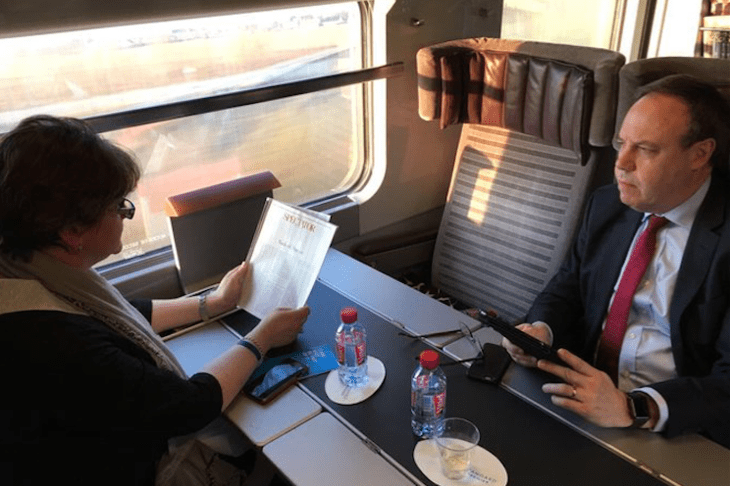That the DUP was going to prove pivotal in Brexit negotiations was inevitable from the early hours of 9 June 2017, when it became clear that Theresa May had failed to secure an overall majority and that no other opposition party would countenance an electoral pact with the Conservatives.
In many ways, the DUP’s powerful position has not been a bad thing. With Irish Taoiseach Leo Varadkar intent on using Brexit as a means of drawing Northern Ireland closer to the republic – and the EU prepared to throw its whole weight behind him – the involvement of the DUP has ensured that the interests of unionists have not been trampled upon.
Until Wednesday morning it seemed that the DUP would support Boris Johnson’s Brexit deal, which was still in the process of negotiation. Then came the announcement from Arlene Foster that her party’s ten Westminster MPs did not feel they could support the deal that was being proposed. They are wrong to dismiss it. While it is understandable that they might want to shrink from any arrangement which includes, to use the common phrase, “a border down the Irish Sea”, they should have a closer look at what will be put before the Commons tomorrow. Far from harming the union, they should appreciate that this Brexit deal will enhance it.
Northern Ireland would enjoy the wins of Brexit. It would benefit from all free trade deals as part of the new UK-wide global free trade system, which would replace the parochial system of EU protectionism. As the UK advances under the powers retrieved from Brussels in the Brexit deal, Northern Ireland would follow every step. It would enjoy the full benefit of any free trade deals, being part of a more globally-minded UK family. Under the proposed Brexit deal, it is guaranteed frictionless trade – as well as immigration control and the restored sovereignty brought by the deal. The rest of the UK might well end up retaining zero-tariff, zero-quota relations with the EU: that’s for the next stage of negotiations. But for Northern Ireland, such access is already in the bag.
It is true that the deal does hold out the possibility of customs and regulatory checks on some goods moving between Northern Ireland and the UK. But that does not amount to a border. There is no possibility of tariffs being charged on goods being transported for domestic consumption. Yes, there may need to be regulatory and customs checks on some goods being transported between commercial premises either side of the Irish Sea, but these need not be carried out at ports – they will be done from a desk, just like VAT and other tax returns.
The arrangement may well prove to be a boon for the Northern Irish economy. In future, certain UK-based companies focused on exporting goods to the EU may have a strong incentive to shift some or all business to Northern Ireland. As it will benefit fully from trade deals struck between the UK and non-EU countries: the province might become a 5,400 square mile free port with a foot in both camps. Tina McKenzie, of the Federation of Small Businesses in Belfast, has spoken about how the free port opportunities that Brexit brings to Northern Ireland could “be transformational for this society, whether you are a unionist, nationalist or neither”.
Quite rightly, the DUP’s priority is to preserve the union. But economic success is critical to this laudable aim. In the early years of the Irish Republic, its largely agrarian economy was dwarfed by Ulster’s industrial economy. Thanks to a combination of the long shadow of the Troubles and the low-tax, Celtic Tiger economic policies south of the border, the disparity is in the other direction: people in Northern Ireland now look on their Southern neighbours with envy. In terms of GDP per capita, Ireland is twice as well off as Ulster. It is not hard to see how, sooner or later, economic self-interest could overrule religious and cultural differences and lead to pressure for the unification of Ireland.
If the DUP wants to stop that, it will have to ensure that Ulster becomes economically more successful. But that certainly won’t be helped by voting down Boris Johnson’s deal on Saturday. All that would achieve is to prolong the agony of the Brexit process even further – or lead to a no deal, with all the upheaval that would cause businesses on either side of the Irish border. You only have to look at how the pound has surged this past week to see that investors appreciate the prospect of Brexit finally being resolved.
The Prime Minister’s deal could still pass without DUP support. A sizeable group of Labour MPs who represent Leave constituencies are coming to the conclusion that their personal failure to support the deal could lead to disaster at the next election. Their numbers could more than make up for lost DUP votes. But it would be far better for the United Kingdom if this deal passed with support from all across the country. The DUP should analyse where its interests really lie and support the deal.
Kate Hoey MP tells Fraser Nelson why the deal’s provisions for Northern Ireland are unacceptable:






Comments